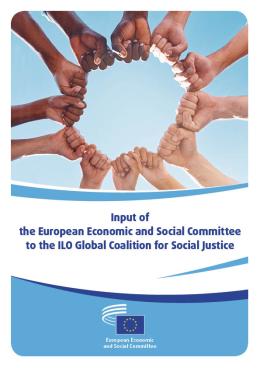European Economic
and Social Committee
ACS en Afrika
Vanaf de eerste Overeenkomst van Lomé (1975) tot de Overeenkomst van Cotonou (2000-2021) zijn de betrekkingen tussen de EU en 79 landen van de groep van staten in Afrika, het Caribisch gebied en de Stille Oceaan (ACS), die onlangs is omgedoopt tot de Organisatie van staten in Afrika, het Caribisch gebied en de Stille Oceaan (OACPS), geregeld in het EU-ACS-partnerschap.
Gedurende deze hele periode heeft het EESC, samen met het maatschappelijk middenveld van de ACS-landen, gestreden voor erkenning van de wezenlijke rol die de niet-statelijke actoren in het ontwikkelingsproces spelen, wat uiteindelijk werd bereikt met de Overeenkomst van Cotonou, waarin het EESC de opdracht kreeg activiteiten en raadplegingen te organiseren met de economische en sociale belangengroepen uit de ACS-landen en de EU, om de standpunten van het maatschappelijk middenveld te verzamelen en het een stem te geven. Het doel is uitwisselingen te bevorderen en aanbevelingen te doen over kwesties en beleidsmaatregelen die van belang zijn voor de betrekkingen tussen de ACS-landen en de EU, om daarna officieel aan de leiders van de EU en de ACS-landen te worden voorgelegd.
In de praktijk worden de activiteiten van het EESC m.b.t. de betrekkingen tussen de EU en de OACPS-landen hoofdzakelijk uitgevoerd onder leiding van een inclusief follow-upcomité ACS-EU, bestaande uit EESC-leden en afgevaardigden die de economische en sociale belangengroepen van de ACS-landen vertegenwoordigen.
Het follow-upcomité EU-ACS onderhoudt regelmatige contacten op verschillende niveaus met de vertegenwoordigers van het maatschappelijk middenveld in de ACS-landen, via:
- Regelmatige vergaderingen van het follow-upcomité ACS-EU,
- regionale seminars in ACS-landen, waarmee een forum wordt geboden voor het bespreken van onderwerpen van algemeen belang met vertegenwoordigers van het maatschappelijk middenveld in wisselende regio's,
- driejaarlijkse algemene vergaderingen van de economische en sociale belangengroepen uit de ACS en de EU in Brussel.
Het EESC onderhoudt ook regelmatige contacten met de vertegenwoordigers van economische en sociale belangengroepen van de Afrikaanse Unie, in het kader van de gemeenschappelijke strategie EU-Afrika. Zo vergadert het EESC jaarlijks met het netwerk van economische en sociale belanghebbenden Afrika-EU.
Het EESC onderhoudt al vele jaren regelmatige contacten met de Paritaire Parlementaire Vergadering ACS-EU; tijdens de zittingen van de plenaire Vergadering presenteert het een verslag over zijn activiteiten.
Het EESC onderhoudt eveneens goede contacten met internationale werkgevers-, werknemers-, landbouw- en consumentenorganisaties. Deze organisaties wijzen de ACS-vertegenwoordigers aan die worden uitgenodigd voor de door het EESC georganiseerde bijeenkomsten, met inbegrip van het follow-upcomité EU-ACS.


